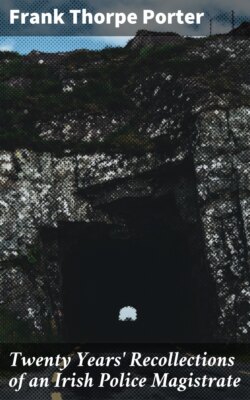Читать книгу Twenty Years' Recollections of an Irish Police Magistrate - Frank Thorpe Porter - Страница 12
На сайте Литреса книга снята с продажи.
CHAPTER V. A MILLIONAIRE.
ОглавлениеTable of Contents
I shall revert to old Skinner Row in reference to the career of an individual which may be said to have commenced there about the year 1782. The incidents which I shall detail are not of an amatory or very sentimental nature, but nevertheless, truly extraordinary. To a Dublin, or even an Irish reader, it is unnecessary to offer an assurance of their truth, or to mention the individual's name. Only one error in reference to him has had currency, and that to a very limited extent. It arose, in all probability, from envy or malice, and consisted in describing him as a person of very imperfect education, of plebeian manners and disposition, and of almost menial avocations. He might have been truly described as well-informed, unaffectedly courteous, unobtrusive of his own opinions, and tolerant of the opinions of others, whilst his business transactions were marked by diligence, integrity, and intelligence. The proprietor of a very extensive establishment in a central situation in Dublin, where bookselling and auctions of libraries were carried on, had advertised for an assistant; and the situation attracted the attention of many competitors, of whom the individual alluded to was one. He was young and active, and sought a personal interview with Mr. V. the advertiser. He was informed that the latter had gone up to Skinner Row, to my father's house, where he would be engaged for upwards of an hour. The applicant hurried off to the narrow, crowded, and inconvenient locality. The footway was disproportionally raised above the carriage road, and at the very door of the house to which he was going, he accidentally slipped and fell. In a disabled condition, he was raised and carried in, and it was ascertained that his ankle was dislocated. His sufferings excited great sympathy. He was conveyed to a bedroom, and surgical aid was procured. Mr. V. manifested great interest in the young man, and came frequently to see him. After several weeks elapsed his cure was effected, and the situation which he sought was given to him. He expressed the deepest gratitude to my father for the kindness he had experienced, and the acquaintance which commenced in the painful accident referred to, ripened ultimately into a very close intimacy. He gained the confidence of Mr. V., who conferred many marks of his esteem, and on the retirement of that gentleman from business, he became, to a great extent, his successor. All his undertakings prospered, and he acquired the reputation of being extremely wealthy. A rumour was circulated that, between the leaves of some books which he had purchased, he had found several bank notes of considerable value, but that report was groundless. In addition to extensive bookselling, he had formed a connection with the house of Bish and Co., of Cornhill, by which he was enabled to do a profitable business in bills on London amongst the Dublin traders, for at that time the facilities of letters of credit were very little known. He also dealt largely in the tickets and shares of the State Lotteries which, three or four times in the year, stimulated the community into legalized gambling. One evening in the year 1794, my father had occasion to call upon him, and found him unusually dissatisfied. He said that Bish's people had made a great mistake in sending him several whole tickets instead of quarters, eighths, or sixteenths, and that three tickets had been left on his hands, involving a loss of sixty pounds. There was not sufficient time to communicate with London before the drawing day, and he could only warn them against committing a similar error on the next occasion. However, in about a week after, my father ascertained that the mistake had eventuated in one of the tickets turning out a prize for twenty thousand pounds. Bish was no longer censured by the man whose wealth, previously considerable, had received a great and unexpected augmentation. The writer of fiction would hesitate before he would adopt a young man lying on the flagway of a city in which he was a complete stranger, with a dislocated ankle, as the material for a future millionaire. The person to whom this narrative refers was not English, Irish, or Scotch. He was a Manxman, who left his native island to seek in Dublin, what he most completely found, a fortune. He died a member of Parliament for an Irish county. Three of his sons attained to similar positions, and one of them was elevated to the House of Peers. Their positions were honourably and worthily acquired.
